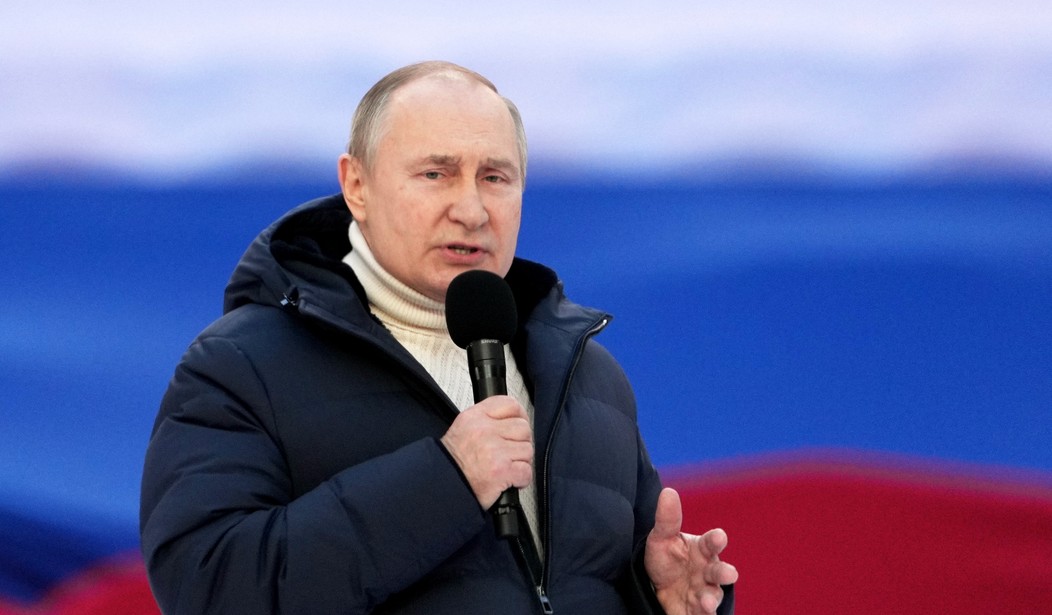Is Russian President Vladimir Putin’s war spreading beyond Ukraine? On Saturday, tensions flared in the South Caucasus in Nagorno-Karabakh, the location of a Russian-backed separatist state a thousand miles to the south. Internationally recognized as Azerbaijan, long-standing Russian ally Armenia has occupied the territory since the 1990s. As of 2020, so have Russian “peacekeepers.”
Last weekend, Russia accused Azerbaijan of breaking a ceasefire agreement. A new front? Perhaps. But there is little doubt these events are tied toPutin’s expansionism.
Moscow is now drawing down some of their Karabakh-stationed “peacekeepers” for redeployment to the Ukrainian battlefront. The move creates a propitious moment for Azerbaijan to reclaim its internationally recognized sovereign territory. One would think Western powers would be supportive of a nation's restoration of what was legally theirs – particularly if it involved ending Russian occupation. After all, the West’s support of Ukraine – whether through expressions of solidarity, intelligence coordination, or arms shipments – is intended to achieve the same end. But Azerbaijan seems not to be granted the same special dispensation to liberate itself from a revanchist Russia. Why?
The unfortunate answer is that when it comes to the Caucasus many Western officials seem not to know where they stand. When they do pick a side, it is often that of Armenia – a country that invaded Azerbaijan’s territory thirty years ago to establish an ethnic Armenian pseudo state in Karabakh they call “Artsakh,” a contested area Russia now helps “defend.” To be clear, the West’s support of Yerevan is largely a function of the sizable Christian Armenian Diaspora. There are more Armenians living in Western countries than in Armenia itself and they constitute a vocal– if not confrontational – lobby, particularly in France and the US.
Recommended
The diaspora propagates a compelling story of how “Artsakh” – in today’s Azerbaijan – is the ancestral lands of the first Christian people of the Caucasus, and the cradle of the modern nation, culture, and people of Armenia. If this sounds familiar, it should. Moscow spins a similar tale of Kievan Rus – today’s Ukraine –as the medieval precursor to the Russian Federation.
Both Armenia in “Artsakh” and Russia in the Donbas claim to be protecting people and heritage in their ancient lands. It comes as little surprise then that the justification for Russian peacekeepers occupying “Artsakh” involves a claim that they are protecting its Christian and cultural heritage.
Even if these dubious claims were true, the world cannot reasonably expect to operate with ninth century borders, nor should contemporary geopolitical decisions hinge on ancient history. It is entirely possible to recognize Russia’s great culture while rejecting Moscow’s territorial claims to bygone lands. So too can Armenia’s claims to “Artsakh” be dismissed.
But many US and European authorities seem inclined to contort themselves into repudiating Russian occupation while supporting Armenian belligerence.In Congress, Rep. Adam Schiff rightly deemed Vladimir Putin a “war criminal” but also demanded $50 million for Artsakh. That Artsakh President Arayik Harutyunyan had voiced support for Putin’s unilateral recognition of the self-proclaimed republics in eastern Ukraine and Armenia had adopted a neutral position on Russia’s invasion seemed not to matter.
Americans would be right to be confused bythe House Intelligence Committee chairman's opposition to the Russian offensive alongside his support of Moscow’s ally– an accomplice noted for supporting breakaway states unrecognized by virtually every Western power. Similar rhetorical gymnastics have taken place in the EU parliament where a resolution was recently passed condemning Russia’s actions in the Ukraine, and then another condemning Azerbaijan for trying to reclaim its own territory from Kremlin-backed separatists.
But why now? It is hardly a coincidence that US monies and EU resolutions to protect Armenian heritage are being pushed at this time. The West’s gaze must be diverted from Armenia’s membership in Russia’s Collective Security Treaty Organization (CSTO) – a NATO-style security pact – and its six-country EU-copycat trade and customs zone, the Eurasian Economic Union (EAEU). That Armenia opened its arms to Russian business and oligarchs just as Western sanctions kicked in speaks for itself.
Contrast this with Azerbaijan who never joined the CSTO, refused to be economically subsumed into the EAEU, ended all ruble trades, cut all flights from Moscow to their capital Baku, and provided free gasoline to Ukrainian emergency services through the network of stations they own across that country. That Azerbaijan’s pipelines bypass Russia and have the capacity to increase flows to replace Europe’s critical petroleum imports is also a pragmatic consideration.
So, who should Western powers support? A country seeking to restore its legally recognized sovereign territory, or a country illegally squatting on it backed by Russian peacekeepers? A country that is part of both Russia’s military and economic zone, or a country that is a member of neither? A country that obfuscates its relations with Russia to a Western audience, or one supplying free fuel to Ukraine’s emergency services?
Western authorities have asked others to act responsibly in choosing sides in the Ukraine crisis. Americans and Europeans must also consider who they are prepared to back. With the battle lines drawn and security interests at stake, there is little that merits blind support for Armenia. US and EU officials are wise to take notice and act accordingly.
Prof. Ivan Sascha Sheehan is the executive director of the School of Public and International Affairs at the University of Baltimore. Opinions expressed are his own. Follow him on Twitter @ProfSheehan

























Join the conversation as a VIP Member